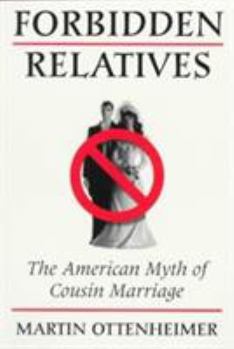Forbidden Relatives: The American Myth of Cousin Marriage
Select Format
Select Condition 
Book Overview
Forbidden Relatives challenges the belief--widely held in the United States--that legislation against marriage between first cousins is based on a biological risk to offspring. In fact, its author maintains, the U.S. prohibition against such unions originated largely because of the belief that it would promote more rapid assimilation of immigrants.
A social anthropologist, Martin Ottenheimer questioned U.S. laws against cousin marriage...
Format:Paperback
Language:English
ISBN:0252065409
ISBN13:9780252065408
Release Date:September 1996
Publisher:University of Illinois Press
Length:192 Pages
Weight:0.70 lbs.
Dimensions:0.6" x 6.0" x 8.9"
Customer Reviews
5 ratings
Forbidden Relatives
Published by Thriftbooks.com User , 17 years ago
Very enlightening sociology. I have a particular interest in this subject because my late husband came from a culture that arranged marriages between first cousins as a matter of course and tradition. When I did his genealogy on Family Tree Maker software, it reports that he is his own second cousin. This book is a "must have" for every amateur genealogist's library.
Too late . . .
Published by Thriftbooks.com User , 17 years ago
I only wish this information had been available when I needed it. (We lived in a state that prohibited such marriage.) I cannot recommend this book too highly; belongs in all reference libraries.
Have we made a Taboo-boo?
Published by Thriftbooks.com User , 24 years ago
This is a work of social anthropology. The author is a professor of anthropology at Kansas State University. It is a quick and easy read even if you managed to avoid anthropology classes in school like I did. References in the text are conveniently relegated to the ten page bibliography.Students of human societies will find this book fascinating of course. Family historians who may find that their lines "cross" more than once due to cousin marriage will also learn a great deal from this book. The acceptability and legality of cousin marriage has varied over time and cultures for a variety of reasons. This book is a guide to understanding those historical and cultural reasons. From Leviticus to Archbishop Parker's Table in the Book of Common Prayer, marriage prohibitions based on the degrees of consanguinity have effected how our families combine for millennia. This book is important background to understanding how families came to be the way they are.The book examines the social and legal prohibitions against cousin marriage in the United States by reviewing their history and comparing U.S. prohibitions to laws and customs about cousin marriage around the world. It reviews the biological evidence regarding the negative impacts of cousin marriage. Finally, the social impacts of cousin marriage and its prohibitions are briefly discussed.Thirty-one U.S. states have some form of prohibition against cousin marriage. Nineteen states have no such prohibitive laws. No European nation prohibits cousin marriages. Why do these prohibitions exist and why the variance between nations and states? This book answers those questions directly.The author argues that such prohibitions were a late nineteenth century enforcement of the bio-evolutionary belief that cousin marriage threatened the civilized status of the United States. Cousin marriage was seen as step towards a "less developed" or "more barbarous" level of human society. States entering the Union prior to about 1860 did not have laws against cousin marriage. Almost all entering after 1860 prohibited cousin marriage to some degree. Clearly, the legal prohibitions began long before modern genetic science could provide any guidance on the issue.The now commonly held assumption in America today is that the prohibitions against cousin marriage are to prevent cousins from producing less intelligent or otherwise "less fit" offspring. We often point to the Royal houses of Europe as examples of the negative effects of cousin marriage. The hemophilia carried by Queen Victoria and passed to many of the other Royal houses through inter-marriage is often erroneously used as a specific admonition against the practice of cousin marriage. Successful marriages between first cousins, such as Charles Darwin and his wife, have been uniformly ignored in the popular mythology of this taboo. The Darwins produced ten healthy offspring, several of whom were just as exceptional as their famous father.The autho
A great help with a lot of information!
Published by Thriftbooks.com User , 25 years ago
This book covers just about everything you could know about cousin relationships. It dips back into the history and how the rumors were created. You get religious perspectives and state laws. I would definately recommend this book to anyone who is looking for the truth in cousin relationships.
Well presented discussion on a difficult subject
Published by Thriftbooks.com User , 25 years ago
If this book does nothing else, it will make you think. It asks questions that many of us believe are not even a part of our lives, and yet the context of the issues demonstrates how such a remote subject could affect us directly.





